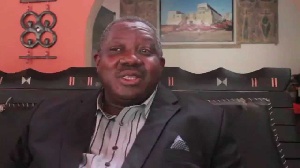Chief Executive Officer of Cenpower, Nana Sam Brew Butler has urged government to take into account the size of a power plant or amount of energy project that an independent power producer (IPPs) is bringing on board before it issues guarantees for them.
“We built a sub-station for Gridco with a letter of comfort from the Ministry of Finance without government saying we will give you something in return. It was more to say we are committed to it, but this arrangement does not appear on the books of government”.
“If you ask for a guarantee, it is like government borrowing -- and everybody is now talking about the debt stock of the country so it goes into the books. So I am suggesting that if government is backing 500MW of power and gives a guarantee that is fine” Nana told B&FT in Accra.
The matter of government guarantees for power projects took centre-stage during a panel discussion at the Power Africa Summit in Accra, following a comment by the Power Minister Dr. Kwabena Donkor in his keynote address that IPPs will no longer be given government guarantees.
Independent Power Producers (IPPs) have maintained that until challenges at the distribution end of the power value chain are resolved to assure them of prompt payment, they will always require some form of a guarantee.
Dr. Kwabena Donkor asked the panelists if it is not a ‘double-whammy’ or a double setback for countries when IPPs keep asking for guarantees, even though their return on investment in developing countries tends to be high due to perceived political and economic risks.
Guarantees, which are essentially how much a government can support a project, have been controversial for some time, given that the IPPs are looking for assurances before they invest.
CenPower is putting up a 350MW gas power plant and are also building a collector’s sub-station for Gridco so it can efficiently evacuate power.
“We are not relying on government for fuel; we have made provision in our financing for three months of liquid fuel, which is over US$200m and could also be used to buy gas. Most of the projects are dependent on government to procure fuel for them, but we decided to do it ourselves”
“We should encourage people to look for smaller plants because in other countries we have many hydro plants; if many of them are prevalent and are acceptable, why can’t we have many thermal plants -- whereby your exposure is not as big as with the 350MW.
“We are talking about 500-900million dollars that no bank is going to give you unless you have guarantees; but if it is manageable, say 20million to 30million and the 30million you are spending can take care of the whole Central Region, why don’t you encourage that?”
He maintained that “Investors should be looking at focusing on the regional level rather than national, since the exposure is not as big as the national”.
In order to address the country’s energy management, which involves the availability of supply, affordability of supply and security of supply, the Power Ministry is encouraging both conventional and non-conventional forms of generation by advocating new gas-fired plants, biomass-fuelled plants, solar and wind farms, tidal-powered generation as well as clean-coal-fuelled generation.
Business News of Thursday, 1 October 2015
Source: B&FT
‘Consider size of plants before issuing guarantees’
Entertainment
















